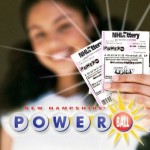Why It Doesn’t Really Matter That Powerball Prices Are Doubling

Todd Sanders / Flickr
It will soon be more expensive to play Powerball, but the prizes will also be better
Between bouts of checking out Republican primary-related economic news, we’ve stumbled on an interesting bit of information about the New Hampshire Lottery courtesy of reporter Denis Paiste at the Union-Leader:
But Powerball revenues are tricky to predict. That’s because there’s a relatively small group of hardcore players who purchase tickets every week. As the jackpots increase, more and more people decide to buy tickets. But since winning the jackpot is based on random chance, whether you have a huge grand prize–and stellar Powerball revenues–is also a function of chance. McIntyre once explained it to StateImpact this way:“Two dollar Powerball tickets will mean more prizes and more million-dollar winners, New Hampshire Lottery Executive Director Charles R. McIntyre said Wednesday.
The last drawing for $1 Powerball tickets will be Saturday, Jan. 14; the $2 tickets will go on sale Jan. 15.
‘It’ll be easier to win, the odds are lower, there will be more $1 million winners throughout the country and hopefully in New Hampshire,’ he said.
Jackpots will start at $40 million. Second prize will jump from $200,000 to $1 million.
The Power Play option will remain $1 pushing the cost of Powerball with Power Play from $2 to $3.
McIntyre said he expects the lottery will sell fewer individual tickets, but revenues will nevertheless increase. ‘That’s the reason we did it,’ he said.”
“Scratch tickets is really where you can have the most impact, and where you should concentrate, because 70 percent of what we sell is scratch tickets…We can’t control what the jackpot for Powerball is, because by definition, it’s a random event. It’s how many folks buy, and did somebody win? And if somebody wins, we go back to starting again [in terms of revenues]. But scratch tickets you can affect. You can make them change. You can make them look better. You can make them act better…And prize structure’s an important part of that.”
As we’ve previously reported, Powerball’s historically been a distant second in popularity to instant tickets. That’s mainly because scratch tickets, with their smaller prizes and greater odds of winning, have a much larger base of devotees. According to figures provided to StateImpact by the New Hampshire Lottery Commission, Powerball sales only accounted for $26.5 million in FY 2011. That’s compared to $161 million in instant ticket sales.

